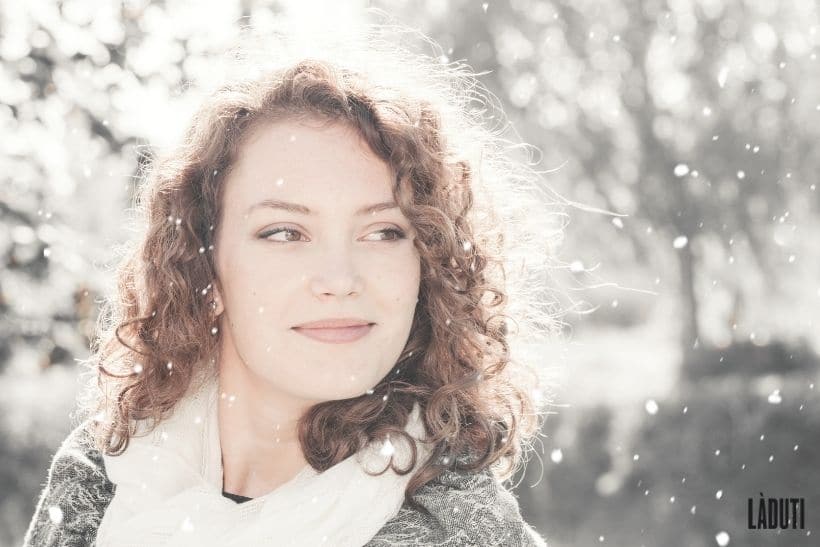The beginning of the year is the time of new resolutions for many. How convenient that we provide you with our useful tips all year round so that you can prepare for the cool season and the seasonal Hair loss can prepare. Those who want to avoid the windy Fall and survives the frosty winter, can also enjoy the beginning of the Spring still enjoy a full head of hair.
In contrast to the Summer In winter, the hair is more exposed to the cold, which can have a lasting effect on the healthy hair growth cycle. Some sufferers only notice that their scalp hair is getting less in the spring months. But those who do not follow the Stress not only keeps a cool head in winter, but also afterwards!
In this blog post, you will learn why head hair decreases in the winter months and what you can do to stimulate the hair growth cycle. Is it all down to genes or does lifestyle make the difference?
Start the next year with Laduti and new resolutions!
Many people want to go above and beyond with their goals for the coming year. But when the hair stops growing and thins out, it's time to strengthen the hair roots. A Hair Serum is characterised by its highly concentrated blend of numerous and beneficial ingredients. Our hair serum has been specially formulated to meet the needs of both female and male scalps, providing the hair roots with over 60 natural and valuable ingredients.
Without hormones and Minoxidil our hair restorer solution helps stimulate healthy hair growth. The Hair Serum is suitable for all those who do not suffer from constitutional hair loss. The carefully formulated formula addresses on the full power of nature back.
What causes hair loss in winter?
If more hair falls out than usual in winter, the cause of seasonal hair loss can already be found in the summer months. At this time, the hair enters its resting phase and stops growing for about three months. Depending on whether this telogen phase begins in early or late summer, hair loss can extend into the winter months. This also depends on whether the head has been exposed to increased heat during the sunny months, because heat and light cause the hair to grow back. Hair faster fail.
Falling hair is also caused by the natural hair growth cycle. The hair growth phase is only completed after two to six years, after which the shedding phase begins and, for some, falls in the winter. In about 80 percent of Men and 20 per cent of the Women genetic hair loss occurs, which can become noticeable for the first time throughout the year.
Genetic disposition
Usually, up to 100 hairs fall out every day on their own and when brushing, which is why a few dwindling hairs do not yet affect hair health. However, if more hairs disappear, genes could be responsible for this, and already at a young age, especially in men Hair loss at 20 emerge. Among other things, this becomes apparent more quickly through the first receding hairline and light-haired people, as they often have finer hair. At the same time, blond people have around 150,000 head hairs, while people with dark head hair grow around 100,000. Whether blond, brunette, black or red-haired - the dwindling hair can also become apparent in all of them through Hair loss at the back of the head show.
Cold
In winter, due to increased exposure to cold, the blood vessels of the scalp contract so that it is not sufficiently supplied with blood. As a result, fewer nutrients enter the bloodstream. At this time of year, the body prepares itself for the natural "coat change" (also: hair change) in spring and the rising temperatures. Therefore, during the telogen phase, a new hair grows in the hair root, causing the old one to fall out. This occurs for some already in the calendrical late autumn, as the meteorological winter already starts on 1 December and the average temperature can vary from year to year.
Nutrient deficiency
In the dark winter months, the body often lacks vitamin D, as this is hardly produced due to the lack of sunlight. Yet almost 90 percent of Germans have a vitamin D deficiency in winter. It is actually a prohormone that prevents the hair follicle cycle from lengthening or shortening. If there is hardly any time left for sunbathing, you can have your vitamin D level checked in consultation with your family doctor and, if necessary, take food supplements.
Also other Vitamins for hair such as vitamins A, C and E are important for healthy hair growth and are supported by a healthy and balanced diet. Nutrition ingested. Among the B vitamins, especially Biotin makes hair appear shiny, fingernails grow faster and the scalp look healthier.
How to avoid hair loss in winter! With our tips

With the sun setting earlier until 21 December, don't lose sight of walking outdoors in the warmer months beforehand. With the sunlight, the body can build up a vitamin D reserve to be sufficiently supplied with this substance in winter. However, this also includes measures that are helpful for hair health during the winter time:
- Headgear and scarf: In low temperatures, wear a hat that also covers the ears so that the vessels in the entire head area do not contract spasmodically. This also applies to the neck and throat, which are kept warm by a scarf.
- A hot cup of tea: Warm yourself from "inside" while adding important nutrients and polyphenols such as those from green tea, among others.
- SaunaThose who believe that a visit to the sauna harms the hair and dries it out are mistaken! Not only the immune system benefits from regular saunas, but also the skin and hair, as blood circulation is stimulated and vital substances can circulate better in the blood. However, when taking care of your hair, refrain from taking showers that are too hot, otherwise the scalp loses too much moisture.
- Movement makes the difference: Lack of exercise not only leads to stiff and inflexible joints and muscles, but also leaves excess toxins in the organism. A healthy acid-base balance ensures that harmful substances are excreted and is characterised by a pH value between 7.36 and 7.44.
Conclusion
When the cold months are just around the corner, your hair can also "freeze". Therefore you should Pay attention to everyday tips such as wearing a warming head covering, which keeps the arteries and veins wide open so that important nutrients can flow through the vascular system. While you are at it, also make sure to reduce StressThe body is brought into motion and given recovery phases.
The reason for increased hair loss in winter can also be due to a androgenetic Alopecia can be attributed to the hair loss. Then it is important that the hair is supported for as long as possible with valuable ingredients from our hair serum, which can counteract a lifestyle-induced Prevent hair loss.
FAQ - Questions and answers
How long does hair loss last in winter?
The natural shedding phase of the hair lasts three months, which is about as long as a whole season. For some, this phase falls in the winter, which then leads to no further complications.
Is hair loss common in winter?
Increased hair loss is most common in the spring and autumn months. In winter or summer, the hair has to deal with greater negative factors for a full head of hair due to exposure to cold and heat.
Can a hair change be responsible for hair loss in winter?
Yes. In animals, the change of hair is called the change of coat, so that they can prepare themselves for the higher temperatures of spring. In humans, on the other hand, this occurs as a "hair change" in a weakened form and also varies in intensity from person to person.



